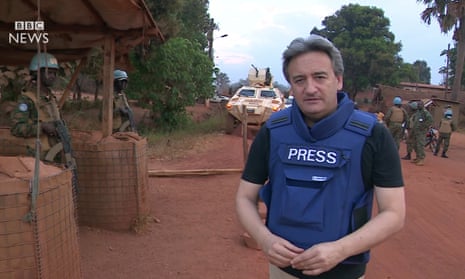“It took 20 years,” writes Fergal Keane in The Madness, “before I came to the point of accepting I was addicted to war.” It was a bitter realisation for the Irish journalist. Feted for his decades of reporting at the sharp end of disaster, Keane built a career on his capacity to take in the worst of human nature – and keep going. Until one day, tormented by his experience of the Rwandan genocide, he couldn’t keep going any longer. This book tells the story of how Keane began to unpick a lifetime of trauma, addiction and fear, traits that made him an alcoholic, a mental wreck – and a star.
Keane made his name writing back from distant war zones: Kosovo, Iraq, Ukraine. But growing up in 1960s Ireland, bloodshed was never far away. The Irish war of independence had ended in 1921, 40 years before his birth. As a child, it was present everywhere, Keane recalls: in family stories and public memorials, in culture, politics – and the brewing conflict in the north. All were seeds carefully planted, Keane thinks. War – or a romanticised idea of it – made him who he was.
So did other struggles. Fergal’s father was a talented actor, a self-taught man of letters and a lifelong alcoholic. Searching for his drunken father in pubs and alleyways, the young Keane developed a bone-deep sense that something was wrong with the world and that it was his responsibility to put it right. Growing up in an alcoholic’s home made Keane anxious, hyper-alert and keen to escape. That escape arrived in the early 1980s, when his budding journalistic career took him from Ireland to South Africa.
The injustice he covers in Africa feeds his sense of vocation; reporting from the violent twilight years of apartheid, he finds the magnetic pull of danger hard to resist. He discovers his tribe: adrenaline-chasing journalists like himself. His drinking, always a problem, gets worse. It doesn’t stop his career taking off. Shortly after his father’s death in 1990, the BBC asks Keane to become its southern Africa correspondent. As he travels to take up the job – “the opportunity of a lifetime” – he has a mental breakdown at the airport. His money and tickets are stolen. He begins to cry uncontrollably. His 11-hour flight is spent in a haze of panic attacks. By the time he reaches Africa, he’s so disoriented that he has to be sedated, then sent home, on sick leave, for weeks.
It’s a warning sign, but one he ignores. Putting all this behind him, Keane ploughs on, numbing himself with alcohol and assignments. It works, or seems to, until Keane’s job – and his own haywire psyche – takes him to Rwanda where genocide unfolds. Isolated, under constant threat of attack, surrounded by a mass murder he’s helpless to stop, Keane again falls apart. A last mission to save orphans of the genocide pushes his nerves – and faith in humanity – past breaking point. Here, as elsewhere, The Madness is engaging without resorting to sensation. Fluent prose follows the decline of the political situation – and of Keane’s own mental health – in chilling, compelling detail.
He leaves Rwanda a changed man: “My adult life is divided,” Keane writes, “between the before and after of that small country in the centre of Africa.” It doesn’t take long to hit rock bottom. He drinks more than ever, he barely sleeps. Until, one day, he reaches out for help. Slowly, Keane changes: he tries rehab for alcoholism, then therapy. He stops drinking for good.
But progress is uneven. Sober, Keane keeps on compartmentalising, reporting from wars and atrocities “to put Rwanda in its proper perspective”. He investigates Kosovo after the genocide; reports from Iraq in the midst of the 2003 invasion. Each new horror leaves fresh scars. He realises, eventually, that something is wrong at a deeper level than the damage caused by drinking. In 2008, after years of nightmares and panic attacks, he receives a diagnosis that’s been hanging over him his whole life: post-traumatic stress disorder.
Keane takes a final step into the unknown: he asks for a desk job. He goes back to rehab, this time for PTSD. He stays away from dangerous jobs, remains in therapy and lists everything he’s thankful for every night. “Being well requires work,” he writes. The Madness doesn’t settle for one-sided narratives. War is horrific – and enticing. Keane is sometimes heroic and often unpleasant; angry and dishonest even to those he loves most. The compulsions that make Keane sick – his insatiable hunger for recognition, excitement, purpose – also make him a success.
In the end though The Madness isn’t about self-discovery, but about rediscovering the world beyond the prison of addiction. Beauty, where it’s found, is fleeting; flowers on the frontlines, friendship among the mass graves and Keane makes a promise to the reader: he’s going to hold on to those moments. He’s going to keep hold of what is good.
The Madness: A Memoir of War, Fear and PTSD by Fergal Keane is published by HarperCollins (£22). To support the Guardian and Observer order your copy at guardianbookshop.com. Delivery charges may apply
